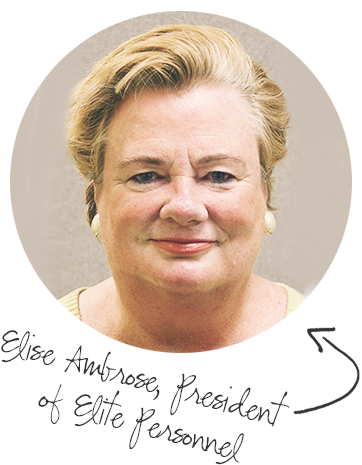Getting back to work after the age of 50 may seem daunting, even impossible, but it’s not. Women are usually faced with this challenge for two reasons: they left the workforce by choice and are now trying to re-enter it or they were laid-off and are scrambling to find a job.


“For those who left the workforce, the key ingredient to getting back in is computer skills.”
“You’re in trouble without them,” advises Elise Ambrose, President of Elite Personnel, a staffing agency in Bethesda, MD. It’s almost impossible for Elise’s staffing agency to place anyone without computer knowledge. Everyone relies on computers in the workplace, from the receptionist to those in the corner office who conduct business at the highest level. It’s not difficult or expensive to learn these skills, she stresses. Tutorials on YouTube and online can help everyone hone their computer and typing skills, she adds.
Before starting the job search, make sure to have a current resumé without a single mistake. “Ask a few friends to proofread it to ensure there are no typos or grammatical problems,” says Elise. Once your resumé is polished let everyone know that you’re looking for a job. Post your job search on Facebook, LinkedIn and Craigslist. Recruiters commonly use these resources.
“I have seen people get very creative with their resumés. A stay-at-home mom, for example, described herself as a ‘director of household affairs’ and listed her skills,” Elise remembers. Also, stay current and list volunteer work so prospective employers know you’ve been active and engaged.

Elise recommends:
- Having strong computer skills. Be proficient with Microsoft Word, Excel and Outlook and understand how to use Google as a research tool.
- Social media skills.
- Posting an up-to-date LinkedIn profile with a good, professional photo.
- Investing in an updated, upgraded wardrobe that includes a crisp black suit.
- Presenting yourself well. In other words, don’t come to an interview smelling like smoke.
- Registering with at least one local staffing agency.
Sad to say, age discrimination is alive and well. Over 3 million workers, over age 50, are looking for full-time employment, according to the AARP. Elise suggests removing dates from your resumé. There is no need to list high-school and university graduation dates or jobs that go back more than 10 years.
Salary expectations depend on your skills and the length of time you’ve been out of work. “Salaries are a bit depressed right now, so taking a pay cut is pretty standard,” Elise says. It might be necessary to take a step back and a 10 to 20 percent cut.  “However, you don’t have to accept something insulting,” she adds. If the company offers benefits it might be worth the pay cut. “Nothing is forever, you can always look for a higher-paying job later,” she says.
“However, you don’t have to accept something insulting,” she adds. If the company offers benefits it might be worth the pay cut. “Nothing is forever, you can always look for a higher-paying job later,” she says.
If you’re angry or disgruntled about losing your job during the economic downturn, don’t show your feelings, Elise advises. “Staying positive is crucial, especially during an interview. We tell job candidates to take it out on us.”
While attitude is important, so is flexibility. Consider and research how to transfer your valuable skills into a new profession. “Change is good, and it’s necessary,” Elise believes. She recently hired a woman who ran the MBA program at a large university. “She knows how to talk to people and how to elicit information, and those skills were a good match for a recruiter position I had available,” Elise explains. There were others too. Elise’s company placed a candidate who had been laid off from a management position into a front desk administrative role. “It was a lesser position but she needed a job. She has since been promoted and manages the membership database and is making more money with excellent benefits,” Elise says. She also had a former HR Manager accept a job as a senior admin in an insurance company, who was later promoted to Manager of Compliance. “They needed jobs, were willing to be flexible and understood that by getting their feet in the door, they could prove themselves, and they did,” Elise says.
As those of us over 50 compete with the millennial generation it’s important to let an employer know you’re flexible.
“Confidently say things like: ‘It’s a growth industry and I like a challenge’ or ‘I have the experience and skills you’re looking for, I just need to learn some of the details’ or ‘I like variety in life.’” If you’re interviewing with a non-profit group, understand the direction of the organization and its mission.  Elise says you never want an employer to think you’re only willing to do one thing or you’ll only do the type of work you did before.
Elise says you never want an employer to think you’re only willing to do one thing or you’ll only do the type of work you did before.
It’s costly to train personnel, and many employers are reluctant to take on the expense, so “stay on top of things,” Elise says. It’s important to understand the bigger concept of technology, smart technology and that it is necessary to be as savvy as the younger generation. “The world is changing and the people who are most successful, change with it,” she says. On the other hand, there’s value in hiring a more seasoned employee. “Less risk is involved because older individuals have demonstrated the ability to work, their loyalty and their work ethic,” she explains. Still, patience and perseverance are needed during the job search.
Elise recommends:
- Staying positive. Attitude is everything.
- Being flexible. Reinvent yourself.
- Staying connected. Networking with everyone you know and joining new organizations.
- Taking a break by volunteering.
- Challenging your brain. Learn new things.
- Keeping your resumé fresh.
AARP recently launched a program called “Life Reimagined” by partnering with companies that have signed a pledge to reach out to older workers. It’s set-up to help guide individuals through change. Check out workreimagined.aarp.org.
By Ramona Duoba

